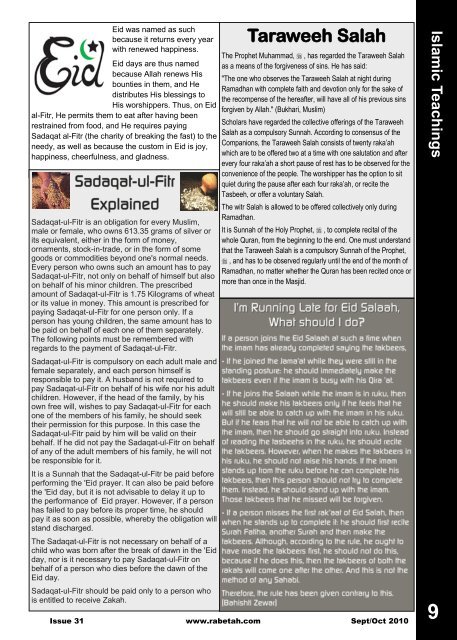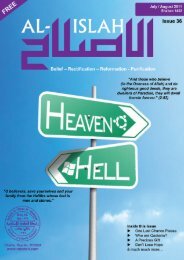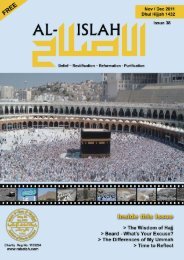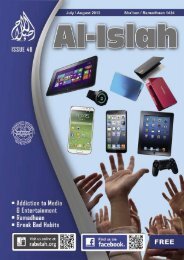Ramadhan - Rabetah
Ramadhan - Rabetah
Ramadhan - Rabetah
You also want an ePaper? Increase the reach of your titles
YUMPU automatically turns print PDFs into web optimized ePapers that Google loves.
Islamic Teachings<br />
Eid was named as such<br />
because it returns every year<br />
with renewed happiness.<br />
Eid days are thus named<br />
because Allah renews His<br />
bounties in them, and He<br />
distributes His blessings to<br />
His worshippers. Thus, on Eid<br />
al-Fitr, He permits them to eat after having been<br />
restrained from food, and He requires paying<br />
Sadaqat al-Fitr (the charity of breaking the fast) to the<br />
needy, as well as because the custom in Eid is joy,<br />
happiness, cheerfulness, and gladness.<br />
Sadaqat-ul-Fitr is an obligation for every Muslim,<br />
male or female, who owns 613.35 grams of silver or<br />
its equivalent, either in the form of money,<br />
ornaments, stock-in-trade, or in the form of some<br />
goods or commodities beyond one's normal needs.<br />
Every person who owns such an amount has to pay<br />
Sadaqat-ul-Fitr, not only on behalf of himself but also<br />
on behalf of his minor children. The prescribed<br />
amount of Sadaqat-ul-Fitr is 1.75 Kilograms of wheat<br />
or its value in money. This amount is prescribed for<br />
paying Sadaqat-ul-Fitr for one person only. If a<br />
person has young children, the same amount has to<br />
be paid on behalf of each one of them separately.<br />
The following points must be remembered with<br />
regards to the payment of Sadaqat-ul-Fitr.<br />
Sadaqat-ul-Fitr is compulsory on each adult male and<br />
female separately, and each person himself is<br />
responsible to pay it. A husband is not required to<br />
pay Sadaqat-ul-Fitr on behalf of his wife nor his adult<br />
children. However, if the head of the family, by his<br />
own free will, wishes to pay Sadaqat-ul-Fitr for each<br />
one of the members of his family, he should seek<br />
their permission for this purpose. In this case the<br />
Sadaqat-ul-Fitr paid by him will be valid on their<br />
behalf. If he did not pay the Sadaqat-ul-Fitr on behalf<br />
of any of the adult members of his family, he will not<br />
be responsible for it.<br />
It is a Sunnah that the Sadaqat-ul-Fitr be paid before<br />
performing the 'Eid prayer. It can also be paid before<br />
the 'Eid day, but it is not advisable to delay it up to<br />
the performance of Eid prayer. However, if a person<br />
has failed to pay before its proper time, he should<br />
pay it as soon as possible, whereby the obligation will<br />
stand discharged.<br />
The Sadaqat-ul-Fitr is not necessary on behalf of a<br />
child who was born after the break of dawn in the 'Eid<br />
day, nor is it necessary to pay Sadaqat-ul-Fitr on<br />
behalf of a person who dies before the dawn of the<br />
Eid day.<br />
Sadaqat-ul-Fitr should be paid only to a person who<br />
is entitled to receive Zakah.<br />
Taraweeh Salah<br />
The Prophet Muhammad, , has regarded the Taraweeh Salah<br />
as a means of the forgiveness of sins. He has said:<br />
"The one who observes the Taraweeh Salah at night during<br />
<strong>Ramadhan</strong> with complete faith and devotion only for the sake of<br />
the recompense of the hereafter, will have all of his previous sins<br />
forgiven by Allah." (Bukhari, Muslim)<br />
Scholars have regarded the collective offerings of the Taraweeh<br />
Salah as a compulsory Sunnah. According to consensus of the<br />
Companions, the Taraweeh Salah consists of twenty raka‟ah<br />
which are to be offered two at a time with one salutation and after<br />
every four raka‟ah a short pause of rest has to be observed for the<br />
convenience of the people. The worshipper has the option to sit<br />
quiet during the pause after each four raka‟ah, or recite the<br />
Tasbeeh, or offer a voluntary Salah.<br />
The witr Salah is allowed to be offered collectively only during<br />
<strong>Ramadhan</strong>.<br />
It is Sunnah of the Holy Prophet, , to complete recital of the<br />
whole Quran, from the beginning to the end. One must understand<br />
that the Taraweeh Salah is a compulsory Sunnah of the Prophet,<br />
, and has to be observed regularly until the end of the month of<br />
<strong>Ramadhan</strong>, no matter whether the Quran has been recited once or<br />
more than once in the Masjid.<br />
Issue 31 www.rabetah.com Sept/Oct 2010<br />
9
















